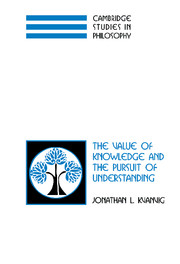Book contents
- Frontmatter
- Contents
- Introduction
- 1 The Value of Knowledge Is External to It
- 2 The Value of True Belief
- 3 The Value of Justification
- 4 Reliabilism, Normativity, and the Special Promise of Virtue Epistemology
- 5 The Gettier Problem and the Value of Knowledge
- 6 Knowledge as Irreducibly Valuable
- 7 Epistemic Attitudinalism: Semantic and Pragmatic Approaches
- 8 Knowledge and Understanding
- 9 Conclusion
- References
- Index
1 - The Value of Knowledge Is External to It
Published online by Cambridge University Press: 14 August 2009
- Frontmatter
- Contents
- Introduction
- 1 The Value of Knowledge Is External to It
- 2 The Value of True Belief
- 3 The Value of Justification
- 4 Reliabilism, Normativity, and the Special Promise of Virtue Epistemology
- 5 The Gettier Problem and the Value of Knowledge
- 6 Knowledge as Irreducibly Valuable
- 7 Epistemic Attitudinalism: Semantic and Pragmatic Approaches
- 8 Knowledge and Understanding
- 9 Conclusion
- References
- Index
Summary
With the scientific sophistication of the local news, I polled some folk (my son and daughter) about the value of knowledge. They apparently think of knowledge as Quine thinks of induction: Those eschewing it tend to fall off cliffs. Knowledge is good, the survey says, because you can make more money with it, get into a better college, get a better job, live a better life.
These answers are examples of finding the value of knowledge in its connection to practical affairs of life. Instead of tracing the value of knowledge to the value of its constituents or some intrinsic value that it has, these accounts claim that knowledge is valuable because it is useful.
The most obvious alternative to this account of the value of knowledge is the view that knowledge has value intrinsically. Academics often lament the pragmatism of undergraduates who prize knowledge only indirectly, in terms of what it can get for them in terms of money, prestige, power, and the like. Academics like to insist, instead, that knowledge is valuable for its own sake and not (just) because it helps you get a good job or get rich.
These two theories provide paradigm examples of the kinds of theories of the value of knowledge I want to explore, but they are only paradigms and not exhaustive of available approaches.
- Type
- Chapter
- Information
- Publisher: Cambridge University PressPrint publication year: 2003

